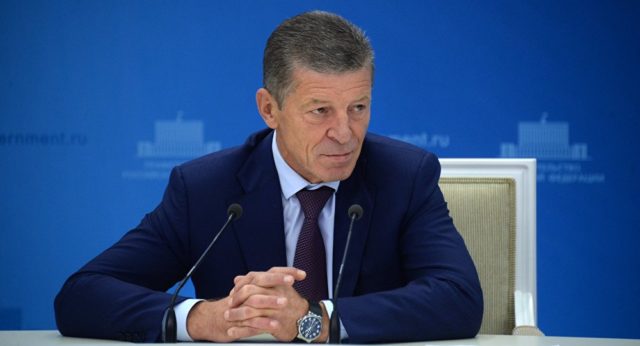
Kozak to Replace Surkov as Putin’s Top Aide on Ukraine (Part Two)
Publication: Eurasia Daily Monitor Volume: 17 Issue: 12
By:

*To read Part One, please click here.
Russian President Vladimir Putin has apparently tasked Dmitry Kozak to further develop a negotiation channel with his counterparts in Ukrainian President Volodymyr Zelenskyy’s team. Putin has for this purpose transferred Kozak from the post of deputy prime minister to that of deputy head of the presidential administration, displacing Putin’s aide Vladislav Surkov from his long-time role on policy toward Ukraine (see Part One).
This negotiation channel has taken shape informally since the summer of 2019 between the top presidential advisors, making it possible also for the two presidents to converse by telephone. Zelenskyy and Putin have spoken at least five times thus far, invariably at Zelenskyy’s initiative.
Zelenskyy’s July 7, 2019, call to Putin marked the start of the telephone dialogue between the presidents and their senior aides. In his latest call a seemingly ingratiating Zelenskyy congratulated Putin on the New Year. Each time, Zelenskyy seems to project weakness and has something to solicit from Putin (to restrain Russia’s proxy forces in Donbas, to release some Ukrainian detainees on the basis of reciprocity, to clear the way for holding a summit meeting). The Kremlin has used this telephone diplomacy to extract concessions from Kyiv in return for allowing the “Normandy” summit to take place on December 9 (see EDM, December 11, 12, 2019).
The Kremlin has acted with cold reserve in this process of telephone diplomacy, but seems to grow more responsive by now. Regularizing the dialogue at both levels—top advisors and presidents—seems to have become a shared goal. A semblance of détente—or a pretense of confidence-building—between Kyiv and Moscow would be misleading, however. Such perceptions would work to Russia’s advantage, and Kyiv would have to pay for such atmospherics with further concessions in the Normandy and Minsk processes.
Putin’s move to sideline Surkov is meant to encourage Kyiv further along this path. Given Surkov’s toxic reputation in Ukraine, the Kremlin took the unusual step of informing Zelenskyy’s team through a well-known Moscow journalist in August 2019, in Kyiv, that Surkov was going to be sidelined, and Kozak would be the main interlocutor to Zelenskyy’s top aides Andrei Yermak and Andrei Bogdan. That Moscow journalist also informed Zelenskyy’s team about some premises to such a dialogue: do not raise the issue of Crimea, seek a package deal on Donbas that could help lift economic sanctions from Russia, improve the status of the Russian language in Ukraine (Gordon.ua, August 19, 2019).
Surkov counterattacked through his close associate, Aleksey Chesnakov (director of the Institute for Current Politics) via an in-house journal (Actualcomment.ru, August 21, 2019). According to them, two influence groups within the Russian government are speaking through Kozak and Surkov, respectively. Kozak views the situation mainly from an economic perspective, seeking to download the burden of financing the Donetsk and Luhansk “people’s republics” and their post-conflict reconstruction onto Ukraine, the West or “anybody but Russia.” By the same token, this group would accept a flexible implementation of the Minsk “agreements” that Kyiv could also find acceptable. This group is “tired of confrontation” and prepared for a “sordid peace.” By “giving the Donbas away,” this group expects to free Russia from the economic sanctions. “If this group prevails, Russia loses.”
The other group (via Surkov and Chesnakov) holds that the United States would not lift the sanctions on Russia but would find ways to impose new sanctions and force Europe to follow suit. Russia must impose a strict implementation of the Minsk “agreements” without preconditions such as disarmament of the “republics.” Ukraine might be allowed a “symbolic sovereignty in Donbas […] but without any real powers.” This solution is more complicated, more expensive, and takes longer, but is the only one that can bring victory.”
The Kremlin needs to offer Ukraine a new interlocutor for a new phase in relations. Surkov is emblematic of Novorossiya, hybrid warfare, and a Russian model of conflict management that involves outright territorial grabs (Abkhazia and South Ossetia, Crimea, Donbas). Kozak, however, is closely associated with a different Russian model of conflict management—namely, the “special status,” which is Russia’s fallback position after the Novorossiya project’s failure, is in line with the Minsk “agreements,” and is being proposed in a parallel case to Ukraine’s neighbor Moldova. The shift from Surkov to Kozak attempts to convey a slight adjustment in the form, not the substance of Russia’s policy toward Ukraine.



